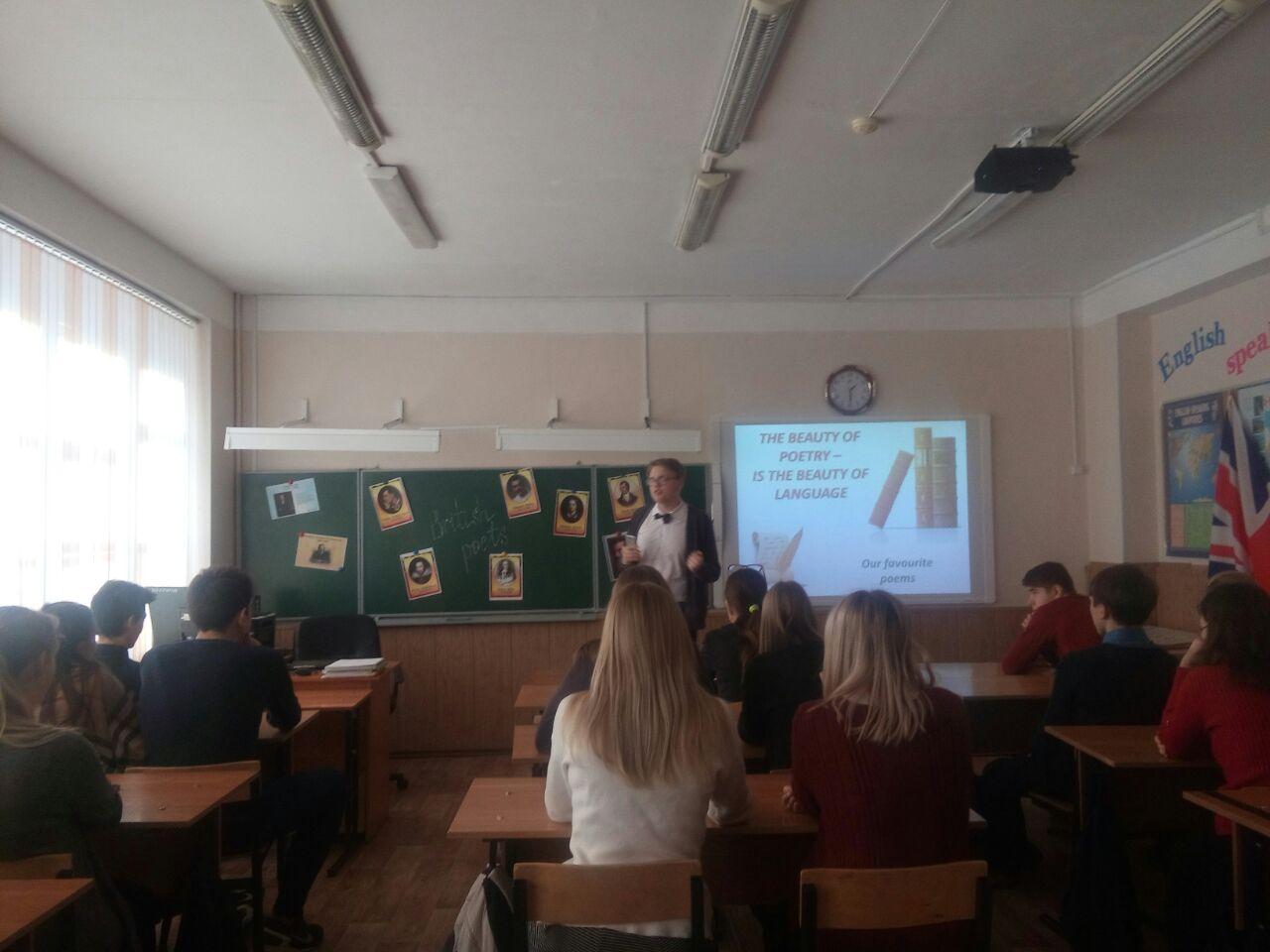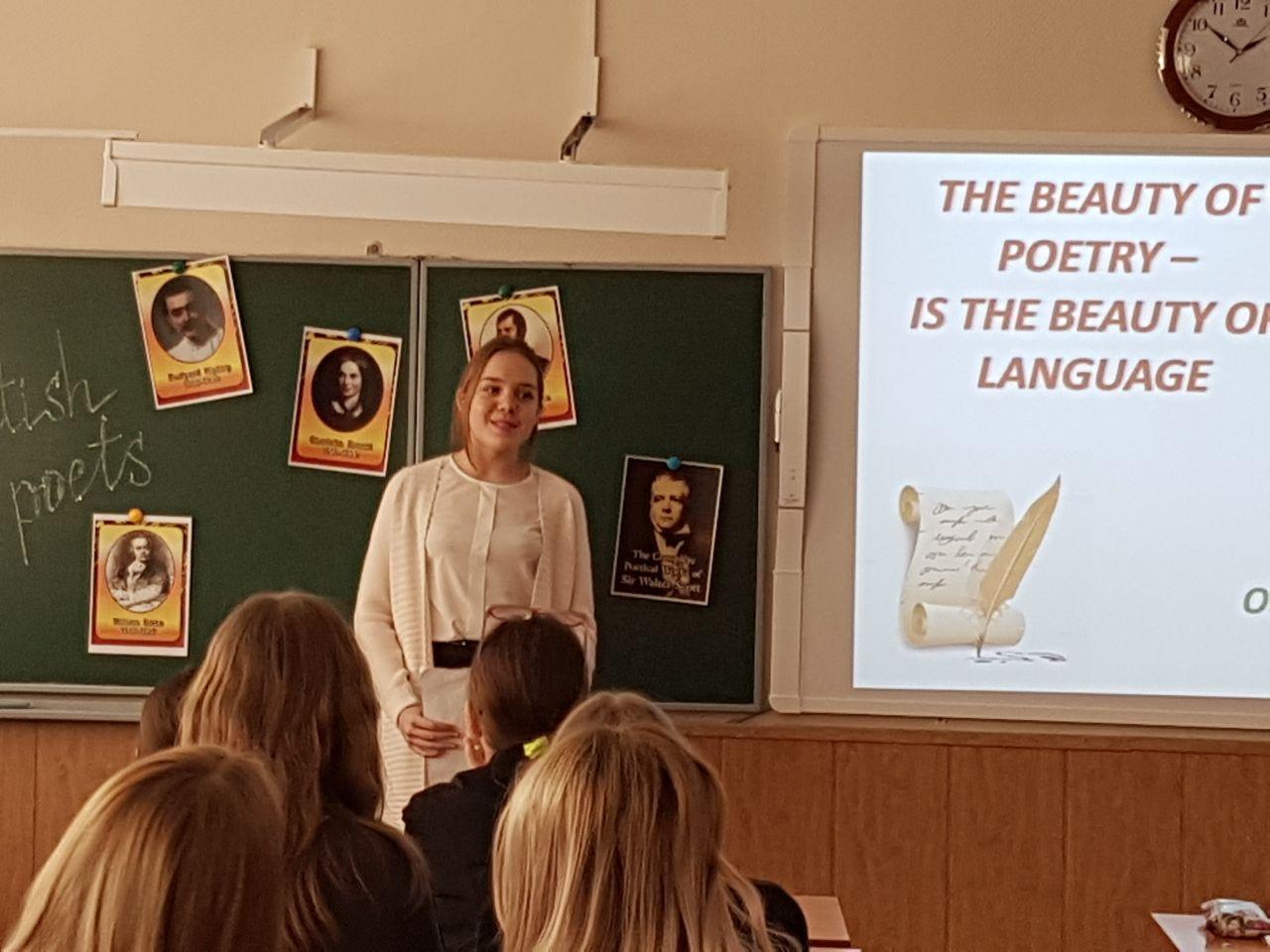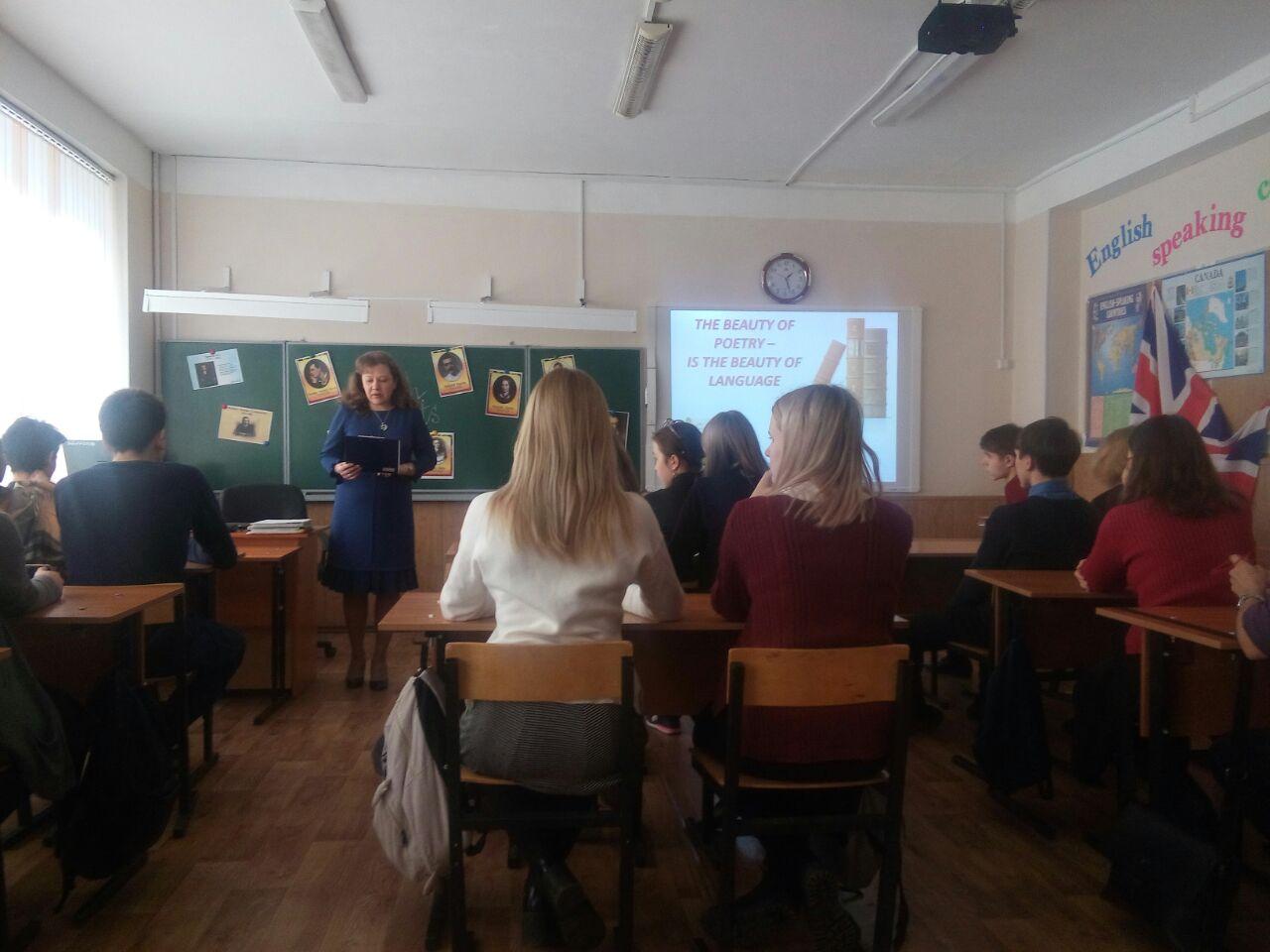г. Новосибирск
| Тема: | The beauty of poetry is the beauty of language |
|
|
|
|
|
|
| Цели: | Создавать условия для ознакомления учащихся с лучшими образцами стихотворений английских и американских авторов, биографиями поэтов, для формирования лексических навыков. |
Создавать условия для развития правильной интонации и произношения. |
Способствовать развитию интереса к изучению английского языка. |
Способствовать развитию таких творческих способностей, как выразительность, эмоциональность, чувство красоты. |
|
|
| Оснащение: | компьютерные презентации, проектор, интерактивная доска, МР3 – файл песни "Auld Lang Syne", портреты британских поэтов |
|
|
|
| Тип занятия: | конкурс чтецов |
|
Ход занятия:
|
|
Организационный момент.
| Dear friends! Today we are going to have a lesson of Poetry. You will recite and listen to different poems of the English and American poets of different times, also the thought about poetry of famous people. As poetry is a very special thing, which you cannot see, but only feel, everybody from you must express the image of your poem by means of excellent expressiveness and correct intonation and tone of your speech. Your judges are your teachers. Imagine your poem before your eyes and try to present it as clear as you can to reach the hearts of the listeners. Somerset Maugham once said “The crown of literature is Poetry. It is its end and aim. The writer of prose can only step aside when the poet passes”. Let’s start with one of the most beautiful poems of Roger McGough and listen to our student. |
Основная часть. |
|
| Student 1.
| 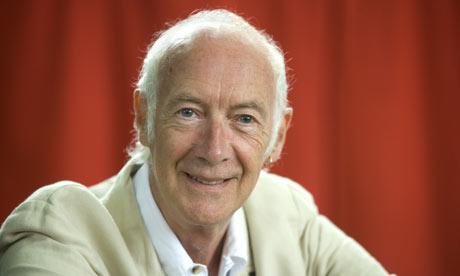 Roger McGough Roger McGough (November 9, 1937) was born in Litherland, Lancashire, to the north of Liverpool, the city with which he is firmly associated, and was educated at the University of Hull at a time when Philip Larkin was the librarian there. Returning to Merseyside in the early 1960s, he worked as a teacher and, with John Gorman, organised arts events. After meeting Mike McGear the trio formed The Scaffold, working the Edinburgh Festival until they signed to Parlophone records in 1966. The group scored several hit records, reaching number one in the UK Singles Chart in 1968 with their version of "Lily The Pink". McGough wrote the lyrics for many of the group's songs and also recorded the musical comedy/poetry album McGough and McGear.
McGough was also responsible for much of the humorous dialogue in The Beatles' animated film, Yellow Submarine, although he did not receive an on-screen credit. At about the same time a selection of his poems was published, along with work from Adrian Henri and Brian Patten, in a best-selling paperback volume of verse entitled The Mersey Sound, first published in 1967, revised in 1983 and again in 2007.
On March 2, 1978, McGough appeared in All You Need Is Cash, a mockumentary detailing the career of a Beatles-like group called The Rutles; McGough's introduction takes so long that he is only asked one question ("Did you know the Rutles?" to which McGough cheerfully responds "Oh yes") before the documentary is forced to move along to other events.
One of McGough's more unusual compositions was created in 1981, when he co-wrote an "electronic poem" called Now Press Return with the programmer Richard Warner for inclusion with the Welcome Tape of the BBC Micro home computer. Now Press Return incorporated several novel themes, including user-defined elements to the poem, lines which changed their order (and meaning) every few seconds, and text which wrote itself in a spiral around the screen.
McGough won a Cholmondeley Award in 1998, and was awarded the CBE in June 2004. He holds an honorary MA from Nene College of Further Education;[citation needed] was awarded an honorary degree from Roehampton University in 2006; as well as an honorary doctorate from the University of Liverpool on 3 July 2006. He was Fellow of Poetry at Loughborough University (1973-5) and Honorary Professor at Thames Valley University (1993).
In 2006, he appeared on an episode of the BBC Television quiz show.
|
|
| Roger McGough
First day at school
A millionbillionwillion miles from home
Waiting for the bell to go. (To go where?)
Why are they all so big, other children?
So noisy? So much at home they
must have been born in uniform.
Lived all their lives in playgrounds.
Spent the years inventing games
that don’t let me in. Games
that are rough, that swallow you up.
And the railings.
All around, the railings.
Are they to keep out wolves and monsters?
Things that carry off and eat children?
Things you don’t take sweets from?
Perhaps they’re to stop us getting out
Running away from the lessins. Lessin.
What does a lessin look like?
Sounds small and slimy.
They keep them in glassrooms.
Whole rooms made out of glass. Imagine.
I wish I could remember my name
Mummy said it would come in useful.
Like wellies. When there’s puddles.
Yellowwellies. I wish she was here.
I think perhaps my name is sewn on somewhere
Perhaps the teacher will read it for me.
Tea’cher. The one who makes the tea. | Первый день в школе
Я в миллибиллионе миль от дома
Стою и жду звонка. Он позовёт меня. (Куда?)
Я самый маленький на игровой площадке.
Вокруг кричат. Всё страшно незнакомо.
А эти — будто в форме родились
И во дворе сто лет уже прожили,
Выдумывая игры! Но меня
Не пригласят играть. Ну и не надо!
Уж больно грубые они — и задаются.
Ещё заборы.
Здесь везде заборы.
Наверно, там чудовища и волки?
Которые едят детей вприкуску?
И у которых брать нельзя конфеты?
Они нам не дадут сбежать с урюков.
Урюк.
Но он же плавает в компоте?
Такой морщинистый и застряет в зубах.
Урюки обитают в кабанетах.
А кабанеты хрюкают. Наверно.
Осталось только вспомнить своё имя.
Оно мне пригодится на урюке —
Не меньше, чем сапожки после ливня.
Сапливни. Где же мама? Так нечестно.
Надеюсь, имя где-нибудь нашито.
Тогда его мучитель прочитает.
Мучитель. Как зубной, но не зубной.
Перевод Елены Фельдман
|
| Student 2.
| Robert Burns (1759 – 1796)
Born in Alloway, Scotland, on January 25, 1759, Robert Burns was the first of William and Agnes Burnes’ seven children. His father, a tenant farmer, educated his children at home. Burns also attended one year of mathematics schooling and, between 1765 and 1768, he attended an “adventure” school established by his father and John Murdock. His father died in bankruptcy in 1784, and Burns and his brother Gilbert took over farm. This hard labor later contributed to the heart trouble that Burns’ suffered as an adult.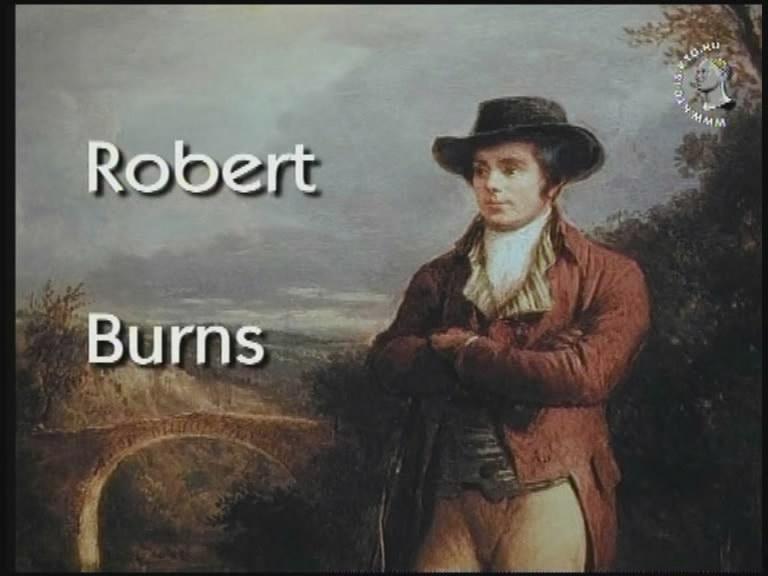 At the age of fifteen, he fell in love and shortly thereafter he wrote his first poem. As a young man, Burns pursued both love and poetry with uncommon zeal. In 1785, he fathered the first of his fourteen children. His biographer, DeLancey Ferguson, had said, “it was not so much that he was conspicuously sinful as that he sinned conspicuously.” Between 1784 and 1785, Burns also wrote many of the poems collected in his first book, Poems, Chiefly in the Scottish Dialect, which was printed in 1786 and paid for by subscriptions. This collection was an immediate success and Burns was celebrated throughout England and Scotland as a great “peasant-poet.” In 1788, he and his wife, Jean Armour, settled in Ellisland, where Burns was given a commission as an excise officer. He also began to assist James Johnson in collecting folk songs for an anthology entitled The Scots Musical Museum. Burns’ spent the final twelve years of his life editing and imitating traditional folk songs for this volume and for Select Collection of Original Scottish Airs. These volumes were essential in preserving parts of Scotland’s cultural heritage and include such well-known songs as “My Luve is Like a Red Red Rose” and “Auld Land Syne.” Robert Burns died from heart disease at the age of thirty-seven. On the day of his death, Jean Armour gave birth to his last son, Maxwell. Most of Burns’ poems were written in Scots. They document and celebrate traditional Scottish culture, expressions of farm life, and class and religious distinctions. Burns wrote in a variety of forms: epistles to friends, ballads, and songs. His best-known poem is the mock-heroic Tam o’ Shanter. He is also well known for the over three hundred songs he wrote which celebrate love, friendship, work, and drink with often hilarious and tender sympathy. Even today, he is often referred to as the National Bard of Scotland.
|
|
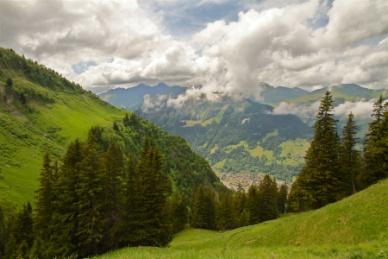
My heart’s in the Highlands
My heart’s in the Highlands, my heart is not here, My heart’s in the Highlands, a-chasing the deer; Chasing the wild-deer, and following the roe, My heart’s in the Highlands, wherever I go.
Farewell to the Highlands, farewell to the North, The birth-place of Valour, the country of Worth ; Wherever I wander, wherever I rove, The hills of the Highlands for ever I love.
Farewell to the mountains, high-cover’d with snow, Farewell to the straths and green vallies below; Farewell to the forests and wild-hanging woods, Farewell to the torrents and loud-pouring floods.
My heart’s in the Highlands, my heart is not here, My heart’s in the Highlands, a-chasing the deer; Chasing the wild-deer, and following the roe, My heart’s in the Highlands, wherever I go. |
В ГОРАХ МОЕ СЕРДЦЕ
В горах мое сердце… Доныне я там. По следу оленя лечу по скалам. Гоню я оленя, пугаю козу. В горах мое сердце, а сам я внизу.
Прощай, моя родина! Север, прощай, Отечество славы и доблести край. По белому свету судьбою гоним, Навеки останусь я сыном твоим!
Прощайте, вершины под кровлей снегов, Прощайте, долины и скаты лугов, Прощайте, поникшие в бездну леса, Прощайте, потоков лесных голоса.
В горах мое сердце… Доныне я там. По следу оленя лечу по скалам. Гоню я оленя, пугаю козу. В горах мое сердце, а сам я внизу! |
|
|
|
|
|
Student 3.
| 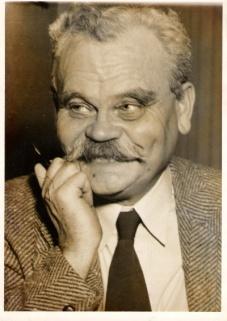
Robert P. Tristram Coffin
Robert Peter Tristram Coffin (March 18, 1892 – January 20, 1955) was a writer, poet and professor at Wells College (1921–1934) and Bowdoin College (1934–1955). He won the Pulitzer Prize for Poetry in 1936.
A native of Brunswick, Maine, and member of one of New England's oldest families, Robert P. T. Coffin graduated from Bowdoin in 1915, and went on to earn graduate degrees from Princeton University (1916) and Oxford University (1920), where he was a Rhodes Scholar. He is best known as the author of more than three dozen works of literature, poetry and history, including the book Strange Holiness, which won the Pulitzer Prize for Poetry in 1936.
His early poetry was derivative of classical forms (e.g., sonnets) and in verbiage and subject archaic. His mature poetry is marked by clarity of subject and symbolism, scanning and usually rhyming lines, and New England locales, persons (particularly farmers, fishermen, young boys, and old ladies), themes, and sometimes vocabulary and accent-based rhymes. He also wrote romantic prose.
There is a public school in Coffin's hometown of Brunswick, Maine, named after him. Coffin Elementary School opened in 1955, in his honor. He dedicated his book "Captain Abby and Captain John" to fellow Bowdoin College alumnus L. Brooks Leavitt, "a fellow son of Maine." Coffin subsequently wrote his poem "Brooks Leavitt" as a eulogy to his old friend, which was read at Leavitt's funeral in Wilton, Maine. "Captain Abby and Captain John" is one of his most well-known works, and centers around the characters Abby and John Pennell, two 19th-century ship captains. A shipbuilding district in Brunswick, Maine, known as Pennellville, provided the inspiration for the book, as well as Coffin's shared lineage with the Pennell family.
Robert P.T Coffin was also a lifelong visual artist who illustrated many of his books in black and white drawings of great detail. The multifarious works describe the natural world of his beloved Maine, its flora and fauna set amidst whimsical architecture and personalized by stylized inhabitants involved in various activities apropos of the essays the art accompanies.
Coffin died of a heart attack in Brunswick, Maine, on January 20, 1955. He was 62 years old. |
|
| The secret heart
by Robert P. Tristram Coffin
Across the years he could recall
His father one way best of all.
In the stillest hour of night
The boy awakened to a light.
Half in dreams, he saw his sire
With his great hands full of fire.
The man had struck a match to see
If his son slept peacefully.
He held his palms each side the spark
His love had kindled in the dark.
His two hands were curved apart
In the semblance of a heart.
He wore, it seemed to his small son,
A bare heart on his hidden one,
A heart that gave out such a glow
No son awake could bear to know.
It showed a look upon a face
Too tender for the day to trace.
One instant, it lit all about,
And then the secret heart went out.
But it shone long enough for one
To know that hands held up the sun.
| Перевод Ларисы Манышевой
Пройдут года сын будет вспоминать
Своих родных - отца и мать.
Когда в тиши ночной, проснувшись ото сна,
Он в полумраке видел у окна,
Отца, стоящего с протянутой рукой,
Несущей в мир, таинственный покой.
Отца, который нёс к нему свечу
И робко гладил сына по плечу.
В ладонях нёс отец огонь и свет,
Ценней которых для ребёнка нет.
Проснувшись , сын не мог понять,
Откуда опустилось солнце на кровать.
А это руки нежного отца
Свернулись в форме сердца, как кольца.
В чём весь секрет, в чём весь вопрос?
Секрет отца лишь в том,
Что сыну Он большое сердце нёс! |
|
|
|
|
| Student 4.
| 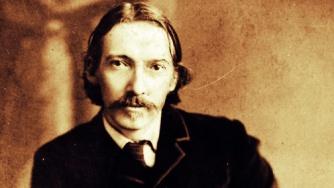 robert louis stevenson robert louis stevenson
R. L. Stevenson
(1850—1894)
Robert Louis Stevenson was born in 1850 in Edinburgh, Scotland.
The boy was often ill and during the cold winters stayed in the house. He had no brothers or sisters. Books were his only friends. Robert read very much. He thought about other countries and drew maps of different places which he wanted to see. The boy wrote stories of adventures on the sea and told those stories to his parents.
In summer when Robert was not ill, he travelled with his father over Scotland. He saw storms on the sea and described those storms in his stories. At school he began to write stories and poems and wanted to be a writer, but his father was an engineer and wanted his son to be an engineer too. He said that writing poems and stories was only a hobby, not a profession.
Stevenson went to the Edinburgh university for some time, then he travelled in different countries and wrote many stories. In 1883 Stevenson published his book “Treasure Island”. Readers liked the book very much. In 1886 Stevenson published his book “Kidnapped”. Then other books of adventures came out. People in many countries read and still read Stevenson’s stories. The hobby of a small boy was now his profession. But the writer was very ill and he died in 1894.
|
|
| My Shadow by Robert Louis Stevenson I have a little shadow that goes in and out with me,
And what can be the use of him is more than I can see.
He is very, very like me from the heels up to the head;
And I see him jump before me, when I jump into my bed.
The funniest thing about him is the way he likes to grow--
Not at all like proper children, which is always very slow;
For he sometimes shoots up taller like an india-rubber ball,
And he sometimes goes so little that there's none of him at all.
He hasn't got a notion of how children ought to play,
And can only make a fool of me in every sort of way.
He stays so close behind me, he's a coward you can see;
I'd think shame to stick to nursie as that shadow sticks to me!
One morning, very early, before the sun was up,
I rose and found the shining dew on every buttercup;
But my lazy little shadow, like an arrant sleepy-head,
Had stayed at home behind me and was fast asleep in bed. | Перевод выполнил Нехай Анатолий Петрович
г. Гатчина, Ленинградской обл., Россия
Моя тень У меня есть тень-малышка, что со мной идет гулять,
Но зачем она нужна мне, не могу никак понять.
На меня она похожа от макушки и до пят,
И она ложится первой, когда лечь в постель велят. Но вот самое смешное – это как она растет,
Нет, совсем не так, как дети, то есть по два дюйма в год;
То она вдруг разрастется, точно шарик надувной,
То совсем она сожмется, так что нет ее со мной. Объяснить ей невозможно, как по правилам играть,
Ей все шуточки шутить бы, нет, чтоб с нами воевать!
То вдруг спрячется за спину, – ну и трус, скажу я вам! –
То, что вовсе неприлично, вдруг прильнет к моим ногам. Но однажды ранним утром, может быть, в шестом часу,
Я спустился в сад и вижу, как пьют лютики росу.
Но ленивая малышка, эта соня, а не тень,
Предпочла остаться дома и опять легла в постель!
|
| Student 5. The Land of Story-books by Robert Louis Stevenson At evening when the lamp is lit,
Around the fire my parents sit;
They sit at home and talk and sing,
And do not play at anything.
Now, with my little gun, I crawl
All in the dark along the wall,
And follow round the forest track
Away behind the sofa back.
There, in the night, where none can spy,
All in my hunter's camp I lie,
And play at books that I have read
Till it is time to go to bed.
These are the hills, these are the woods,
These are my starry solitudes;
And there the river by whose brink
The roaring lions come to drink.
I see the others far away
As if in firelit camp they lay,
And I, like to an Indian scout,
Around their party prowled about.
So when my nurse comes in for me,
Home I return across the sea,
And go to bed with backward looks
At my dear land of Story-books.
|
Вычитанные страны
Вкруг лампы за большим столом Садятся наши вечерком. Поют, читают, говорят, Но не шумят и не шалят.
Тогда, сжимая карабин, Лишь я во тьме крадусь один Тропинкой тесной и глухой Между диваном и стеной.
Меня никто не видит там, Ложусь я в тихий мой вигвам. Объятый тьмой и тишиной, Я - в мире книг, прочтенных мной.
Здесь есть леса и цепи гор, Сиянье звезд, пустынь простор - И львы к ручью на водопой Идут рычащею толпой.
Вкруг лампы люди - ну точь-в-точь Как лагерь, свет струящий в ночь, А я - индейский следопыт - Крадусь неслышно, тьмой сокрыт...
Но няня уж идет за мной. Чрез океан плыву домой, Печально глядя сквозь туман На берег вычитанных стран.
Перевод Вл. Ходасевича |
| Student 6.
| Lord George Gordon Byron (1788-1824) was as famous in his lifetime for his personality cult as for his poetry. He created the concept of the 'Byronic hero' - a defiant, melancholy young man, brooding on some mysterious, unforgivable event in his past. Byron's influence on European poetry, music, novel, opera, and painting has been immense, although the poet was widely condemned on moral grounds by his contemporaries. George Gordon, Lord Byron, was the son of Captain John Byron, and Catherine Gordon. He was born with a club-foot and became extreme sensitivity about his lameness. Byron spent his early childhood years in poor surroundings in Aberdeen, where he was educated until he was ten. After he inherited the title and property of his great-uncle in 1798, he went on to Dulwich, Harrow, and Cambridge, where he piled up debts and aroused alarm with bisexual love affairs. Staying at Newstead in 1802, he probably first met his half-sister, Augusta Leigh with whom he was later suspected of having an incestuous relationship. 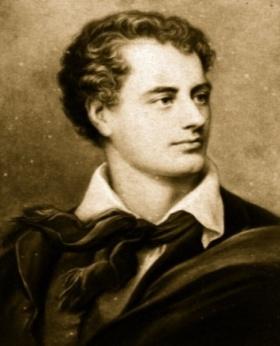
|
|
|
|
|
|
|
|
|
|
|
| She walks in beauty
By Lord George Gordon Byron
She walks in beauty, like the night
Of cloudless climes and starry skies;
And all that's best of dark and bright
Meet in her aspect and her eyes:
Thus mellow'd to that tender light
Which heaven to gaudy day denies.
One shade the more, one ray the less,
Had half impair'd the nameless grace
Which waves in every raven tress,
Or softly lightens o'er her face;
Where thoughts serenely sweet express
How pure, how dear their dwelling-place.
And on that cheek, and o'er that brow,
So soft, so calm, yet eloquent,
The smiles that win, the tints that glow,
But tell of days in goodness spent,
A mind at peace with all below,
A heart whose love is innocent!
|
Она идет во всей красе —
Светла, как ночь её страны.
Вся глубь небес и звёзды все
В её очах заключены.
Как солнце в утренней росе,
Но только мраком смягчены.
Прибавить луч иль тень отнять —
И будет уж совсем не та
Волос агатовая прядь,
Не те глаза, не те уста
И лоб, где помыслов печать
так безупречна, так чиста.
А этот взгляд, и цвет ланит,
И лёгкий смех, как всплеск морской, —
Всё в ней о мире говорит.
Она в душе хранит покой.
И если счастье подарит,
То самой щедрою рукой.
Перевод С.Я. Маршака |
| Student 7. Stances for music By Lord George Gordon Byron
There be none of Beauty»s daughters With a magic like Thee; And like music on the waters Is thy sweet voice to me: When, as if its sound were causing The charm»d ocean»s pausing, The waves lie still and gleaming, And the lull»d winds seem dreaming: And the midnight moon is weaving Her bright chain o»er the deep, Whose breast is gently heaving As an infant»s asleep: So the spirit bows before thee To listen and adore thee; With a full but soft emotion, Like the swell of Summer»s ocean. | Ни одна не станет в споре Красота с тобой. И, как музыка на море, Сладок голос твой! Море шумное смирилось, Будто звукам покорилось, Тихо лоно вод блестит, Убаюкан, ветер спит. На морском дрожит просторе Луч луны, блестя. Тихо грудь вздымает море, Как во сне дитя. Так душа полна вниманья, Пред тобой в очарованье; Тихо все, но полно в ней, Будто летом зыбь морей.
|
|
|
|
| Student 8-9 | 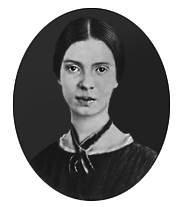 Emily Dickinson Emily Dickinson Date of birth : 1830-12-10
Date of death : 1886-05-15
Birthplace : Amherst, Massachusetts, United States
Nationality : American
Emily Dickinson, also known as Emily Elizabeth Dickinson born December 10, 1830 in Amherst, Massachusetts, United States - died May 15, 1886 was an American author and poet.
One of the finest lyric poets in the English language, the American poet Emily Dickinson (1830-1886) was a keen observer of nature and a wise interpreter of human passion. Her family and friends published most of her work posthumously.
American poetry in the 19th century was rich and varied, ranging from the symbolic fantasies of Edgar Allan Poe through the moralistic quatrains of Henry Wadsworth Longfellow to the revolutionary free verse of Walt Whitman. In the privacy of her study Emily Dickinson developed her own forms and pursued her own visions, oblivious of literary fashions and unconcerned with the changing national literature. If she was influenced at all by other writers, they were John Keats, Ralph Waldo Emerson, Robert and Elizabeth Barrett Browning, Isaac Watts (his hymns), and the biblical prophets.
Dickinson was born on Dec. 10, 1830, in Amherst, Mass., the eldest daughter of Edward Dickinson, a successful lawyer, member of Congress, and for many years treasurer of Amherst College, and of Emily Norcross Dickinson, a submissive, timid woman. The Dickinsons' only son, William Austin, also a lawyer, succeeded his father as treasurer of the college. Their youngest child, Lavinia, was the chief housekeeper and, like her sister Emily, remained at home, unmarried, all her life. The sixth member of this tightly knit group was Susan Gilbert, an ambitious and witty schoolmate of Emily's, who married Austin in 1856 and moved into the house next door to the Dickinsons. At first she was Emily's confidante and a valued critic of her poetry, but by 1879 Emily was speaking of her "pseudo-sister" and had long since ceased exchanging notes and poems.
EarlyEducation
Amherst in the 1840s was a sleepy village in the lush Connecticut Valley, dominated by the Church and the college. Dickinson was reared in Trinitarian Congregationalism, but she never joined the Church and probably chafed at the austerity of the town. Concerts were rare; card games, dancing, and theater were unheard of. For relaxation she walked the hills with her dog, visited friends, and read. But it is also obvious that Puritan New England bred in her a sharp eye for local color, a love of introspection and self-analysis, and a fortitude that sustained her through years of intense loneliness.
Dickinson graduated from Amherst Academy in 1847. The following year (the longest time she was ever to spend away from home) she attended Mount Holyoke Female Seminary at South Hadley, but because of her fragile health she did not return. At the age of 17 she settled into the Dickinson home and turned herself into a competent housekeeper and a more than ordinary observer of Amherst life.
|
| Student 10.
I reason, Earth is short... by Emily Dickinson I reason, earth is short,
And anguish absolute,
And many hurt;
But what of that? I reason, we could die:
The best vitality
Cannot excel decay;
But what of that? I reason that in heaven
Somehow, it will be even,
Some new equation given;
But what of that?
|
Как краток путь земной,
как безысходна боль,
и сколько бед нас ждет
– я знаю. Ну, и что? Смерть ожидает всех,
и никакой расцвет
не вечен: всё сгниет.
– Я знаю. Ну, и что? Однажды в небесах
всё взвесят на весах,
получит всяк – свое.
– Я знаю. Ну, и что?
Перевод Л.В.Кириллиной
|
| Student 11. Civilization by Dan Bull [Intro]
We learned to band together and endeavour
Clasp our hands together
Man developed language, letters
An incredible advantage, getting plans together
But would we stand the test of time
Against the planet's reckless climate
And its angry weather?
[Verse 1]
Spread the sails
And head west against the gales
And storms aboard Norse longboats
With decks as dense as nails
Our aim was riding waves
And finding, claiming strange horizons
Invading islands
Native populations slain with violence
Enslaved and made to aim skyward
Think of bigger things - sphinxes, pyramids
Raise them high in the name of different kings
The different things we've held sacred, divine
Through places and times
The range of supplications and rites
Through ages we find
Nations arise
As old civilizations crumble to dust
Becoming strangers in time, waiting to die
Replaced in the night
The day breaks and the light changes
Illuminating newer human faces as fights rage
The human race is facing the might
Of righteous states who would write
The history books even if it took a knife's blade
To find the right page
Sengoku Jidai
Men offered to die
For the honour of a warrior's life
[Verse 2]
The sun's coming and we're watching it rise
As a new era's here, it's as solid as iron
Pull the tongs from the fire
Strike the hammer to the anvil
Craft a weapon to bring an enemy to a standstill
The blacksmith is the wizard that gives us
These powers - devour enemies
Leaping down from the siege towers
The better the tech is
The lesser the effort to wreck it
The less time to see their eyes
And feel sympathetic
Never regret it
A true knight never stays a true blade
Never says touché
But would forever lay in blue rays of weathered glades
To demonstrate his never-ending dedication
To the crusade
Reformation through flame
And after the cremation is a new age
Time's quill is quick to spill its ink onto a new page
[Verse 3]
The faces are the same as when in days gone
But brains are cultivated thus creating
The Renaissance
We're still using steel tools to stay strong
Replacing blades with greater trades
Pen and paper, song
Faith in God is tested, hiding in the desert
Men excited, then enlightened by the scientific method
Tried describing its expression
By inscribing his impression
When applying it to heavenly bodies
That everybody reckoned
Must have been made by a creator or a greater force
Nature's author faced examination never faced before
The grace of horse and rider
Replaced by wars and violence
Debased the laws of science
Made the case for all the pious
Why is it progress always leads to loads of mess
The western region spread across the globe and coalesced
Settlers spread disease with effortless ease
Was it reckless or did it just happen inevitably?
While evidently we never can see
Through the lens of this century
But there's no retreating now
Whether or not it was meant to be
[Verse 4]
The seven seas were sailed
Navies prevailed
Leaving trails of devastation in their wake
As people wailed
A world of wonder plundered traded in the name of progress
But human nature's way shows we should expect no less
Oh yes, struck by the realisation this is just civilisation
In the natal stages of industrialisation, trust me when I say
That previous achievements are just child's play
Compared to this colossal school of thought
We set the world ablaze with fossil fuel we bought
It's an epiphany
Giving us pretty much infinite energy
It's electricity
Edison, Nikola Tesla - different inventors
Giving us everything we depend on
Whether it's engines, cinema, television or telecoms
Sending a message and spreading it on
These unreal frontier channels
We develop the tech and then sell it on
The reel travels round With the speed of a machine gun's barrels
Machinery's a meaner beast
And we're still in the saddle
No need for cavalry
Battle superseded that with ease
Allies and axis
Charging each other like batteries
A power vacuum allowing the superstates to flourish
Redistribute the food
Even if it means people are malnourished
Propaganda is the only view
That you're allowed to publish
‘Cause totalitarians are well aware
Of how to punish
Gunning down numbers countless
For doubtless nothings that they've done
But that won't stop subversive insurgents
From coming out with courage
Using their power to the fullest
Whether creativity
Or demonstrating general relativity
Evidently when we find time to be efficient
Einsteinian clear vision
Can reveal the precision behind the blinds
Nuclear fission
Despite derision
Physicists decide the mission
Is dividing, splitting atoms
‘Til a blinding light is given
Quite efficient
The divine right to mankind's plight is christened
A minor decision
Hijacked by politicians
But as long as they listen
To the will of the people
Treat all as brilliant equals
We can achieve more
Than we've ever conceived before
Leave this poor place
Please explore space
Earth, she's a small base
Even more awaits
I implore great leaders
To lead with all the grace
Of which we're capable
And be the author of your fate
Band together and endeavour
Clasp our hands together
As our ancestors have
And stand the test of time forever
|
|
|
Teacher: |
“Auld Lang Syne” is one of Burns’s most widely known works. It is sung by British people when they celebrate the beginning of the new year at 12 o’clock on December 31st and on other important occasions. Let’s listen to the song and sing it along.
|
| Auld Lang Syne
Chorus: For auld lang syne, my dear, . For auld lang syne, We’ll take a cup o’ kindness yet, For auld lang syne. I. Should auld acquaintance be forgot, And never brought to mind? Should auld acquaintance be forgot, And days o’ lang syne? II. And there’s a hand, my trusty fiere, And gie’s a hand o’ thine, And we’ll take a right guid-willie waught For auld lang syne. III. And surely ye’ll be your pint-stowp, And surely I’ll be mine; And we’ll take a cup o’ kindness yet For auld lang syne! | Забыть ли старую любовь И не грустить о ней? Забыть ли старую любовь И дружбу прежних дней? За дружбу старую — До дна! За счастье прежних дней! С тобой мы выпьем, старина, За счастье прежних дней. Побольше кружки приготовь И доверху налей. Мы пьем за старую любовь, За дружбу прежних дней. За дружбу старую — . . До дна! За счастье юных дней! По кружке старого вина За счастье юных дней. И вот с тобой сошлись мы вновь. Твоя рука — в моей. Я пью за старую любовь, За дружбу прежних дней! перевод С.Я.Маршака |
|
Жюри подводит итоги конкурса, называет лучших чтецов. |
|
Использованные источники:
Афанасьева О.В., Мехеева И.В. «Английский язык. VIII класс» Аудиокурс к учебнику, Москва «Просвещение», 2010 Тумблина О.В. Лекции по английской литературе V-XX веков, СПб.: Каро, 2003 https://www.poemhunter.com/roger-mcgough/biography/ http://www.stihi.ru/2014/08/20/38 www.online-literature.com/byron https://www.poemhunter.com/robert-peter-tristram-coffin/biography/ http://www.stihi.ru/2015/08/05/6844 http://www.cynical-english.com/2013/09/r-l-stevenson-kidnapped.html http://www.primavista.ru/rus/contests/na-yazyke-detstva/works/stihotvorenie15 https://www.poemhunter.com/poem/the-land-of-story-books/ http://www.poets.org/viewmedia.php/prmMID/16116 http://www.songlyrics.com/dan-bull/civilization-lyrics/ http://www.browsebiography.com/bio-emily_dickinson.html
Литература Великие поэты мира о любви и весне. – Астрель, 2012. Р.Бёрнс. Стихотворения. – Профиздат, 2013. Д.Байрон. Стихи и поэмы. – АСТ, Транзиткнига, 2004. Роберт Бёрнс в переводах Маршака. –М.,Гослитиздат, 1959. COLLINS, Russian-English/English-Russian Dictionary/
|








 Roger McGough
Roger McGough


 robert louis stevenson
robert louis stevenson
 Emily Dickinson
Emily Dickinson 